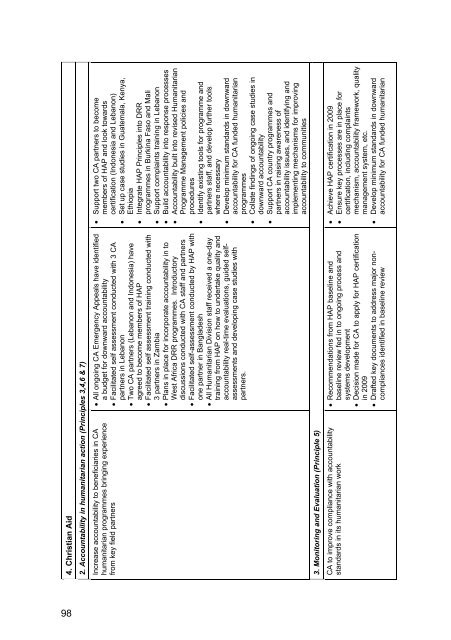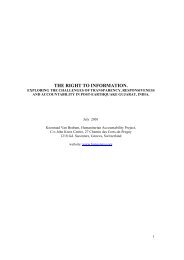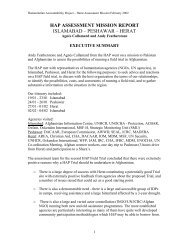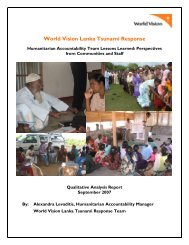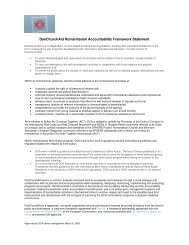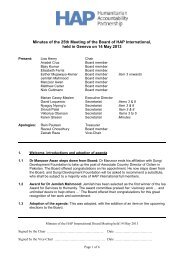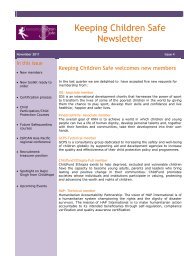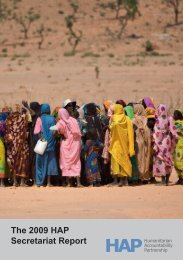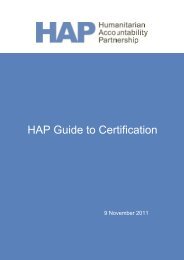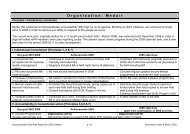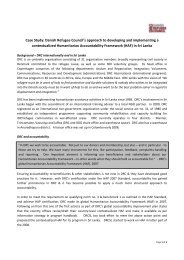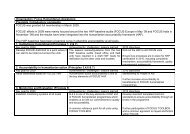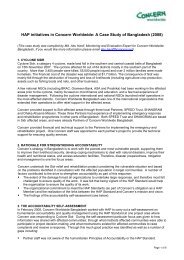Chapter Four - HAP International
Chapter Four - HAP International
Chapter Four - HAP International
You also want an ePaper? Increase the reach of your titles
YUMPU automatically turns print PDFs into web optimized ePapers that Google loves.
4. Christian Aid<br />
2. Accountability in humanitarian action (Principles 3,4,6 & 7)<br />
Increase accountability to beneficiaries in CA<br />
humanitarian programmes bringing experience<br />
from key field partners<br />
• All ongoing CA Emergency Appeals have identified<br />
a budget for downward accountability<br />
• Facilitated self assessment conducted with 3 CA<br />
partners in Lebanon<br />
• Two CA partners (Lebanon and Indonesia) have<br />
agreed to become members of <strong>HAP</strong><br />
• Facilitated self assessment training conducted with<br />
3 partners in Zambia<br />
• Plans in place for incorporate accountability in to<br />
West Africa DRR programmes. Introductory<br />
discussions conducted with CA staff and partners<br />
• Facilitated self-assessment conducted by <strong>HAP</strong> with<br />
one partner in Bangladesh<br />
• All Humanitarian Division staff received a one-day<br />
training from <strong>HAP</strong> on how to undertake quality and<br />
accountability real-time evaluations, guided selfassessments<br />
and developing case studies with<br />
partners.<br />
3. Monitoring and Evaluation (Principle 5)<br />
CA to improve compliance with accountability<br />
standards in its humanitarian work<br />
• Recommendations from <strong>HAP</strong> baseline and<br />
baseline review fed in to ongoing process and<br />
systems development<br />
• Decision made for CA to apply for <strong>HAP</strong> certification<br />
in 2009<br />
• Drafted key documents to address major noncompliances<br />
identified in baseline review<br />
The 2008 Humanitarian Accountability Report<br />
• Support two CA partners to become<br />
members of <strong>HAP</strong> and look towards<br />
certification (Indonesia and Lebanon)<br />
• Set up case studies in Guatemala, Kenya,<br />
Ethiopia<br />
• Integrate <strong>HAP</strong> Principles into DRR<br />
programmes in Burkina Faso and Mali<br />
• Support complaints training in Lebanon<br />
• Build accountability into response processes<br />
• Accountability built into revised Humanitarian<br />
Programme Management policies and<br />
procedures<br />
• Identify existing tools for programme and<br />
partners staff, and develop further tools<br />
where necessary<br />
• Develop minimum standards in downward<br />
accountability for CA funded humanitarian<br />
programmes<br />
• Collate findings of ongoing case studies in<br />
downward accountability<br />
• Support CA country programmes and<br />
partners in raising awareness of<br />
accountability issues, and identifying and<br />
implementing mechanisms for improving<br />
accountability to communities<br />
• Achieve <strong>HAP</strong> certification in 2009<br />
• Ensure key processes are in place for<br />
certification, including complaints<br />
mechanism, accountability framework, quality<br />
management system, etc.<br />
• Develop minimum standards in downward<br />
accountability for CA funded humanitarian<br />
73<br />
98


